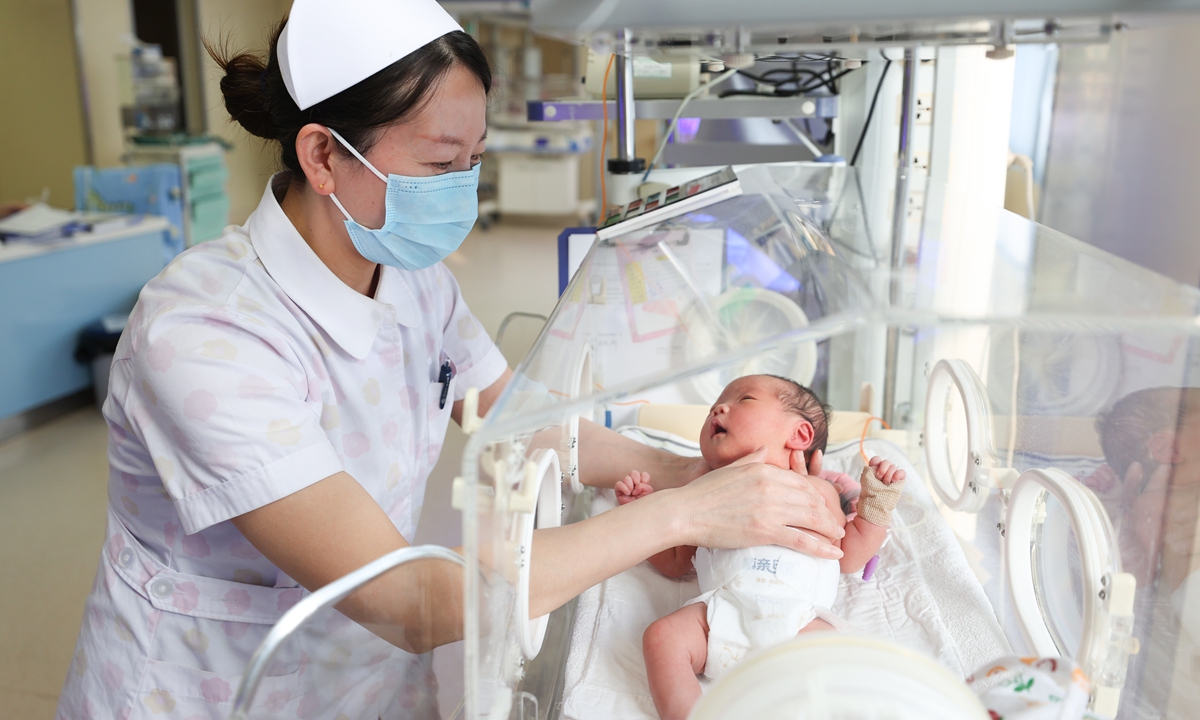
A medical staff member cares for a newborn at the neonatal care unit of a hospital in Lianyungang, East China's Jiangsu Province on January 1, 2024. Photo: VCG
Latest statistics disclosed by authorities of multiple places across China have seen an increase in the number of newborns during the first half of 2024, compared with the same period last year. The year-round statistics of newborns this year is expected to be higher than last year, demographers predicted.
While China's National Bureau of Statistics and the National Health Commission have not yet released data on the birth rate for the first half of 2024, some governments in localities across the country have already released their statistics for newborns for the first half (or the first few months) of this year.
According to the local statistics bureau in Baoji in Northwest China's Shaanxi Province, a total of 3,569 babies were born in five hospitals and midwifery clinics in four counties in the city during the first half of 2024, a year-on-year increase of 346, from 3,223, or an increase of 10.7 percent.
Meanwhile, newborns in Tianmen, Central China's Hubei Province, have amounted to 4,232 as of August 14, a year-on-year increase of 431, or an 11.3 percent increase, according to Hubei Daily.
In Qingdao, East China's Shandong Province, the population monitoring data show that the newborns with local household registration during the first half of 2024 amounted to 22,669, an increase of 5.93 percent from last year, reversing the year-on-year decline trend of two consecutive years, Du Weiping, an official with the Qingdao Health Commission, said during an interview on August 20, according to The Paper.
Based on the statistics of pregnant women registered at local hospitals, it is expected that the year-round number of newborns in Qingdao in 2024 will be on par with or slightly higher than that of last year, Du said.
Du attributed the increase in the number of newborns to the increase in women of childbearing age and more women choosing to have children. Moreover, Chinese people prefer their children to be born in the auspicious Year of the Dragon, which is this year. The various fertility support policies encouraging childbirth are also a reason for more couples choosing to have children.
He Yafu, an independent demographic expert, told the Global Times on Monday that the increase in birthrate is also a result of the growing number of marriage registrations nationwide in 2023, with an increase of 847,000 compared to the previous year. He estimates that this year's birth population will exceed last year's 9.02 million, but the likelihood of surpassing 10 million is not high.
However, whether the rising trend will sustain will rest on the future marriage registrations, the number of women of childbearing age and whether the younger generations choose to have children, He said.
Echoing He, Liang Zhongtang, a fellow researcher at the Shanghai Academy of Social Sciences, said that the ultimate reversal in the number of newborns depends on the population structure.




